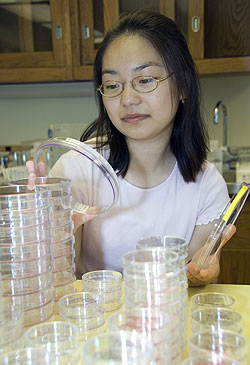Hannah Lee, a senior at Parkway Central High School, spent six weeks this summer running high-energy electrical shocks through cultured cells taken from a cervical cancer tumor.
“We wanted to see if these electric shocks kill the cells without damaging neighboring cells as much as chemotherapy and traditional radiation do,” Lee said.

She determined the number of pulses needed to effectively kill the cells and discovered, unexpectedly, that the cells die from a different mechanism than apoptosis (cell suicide).
Lee participated in the 2007 Pfizer-Solutia Partnership of Universities’ Students and Teachers as Research Scientists (STARS) program for gifted high-school students.
Seventy-two academically talented high school juniors and seniors from the United States, and even a few from Greece and Korea, worked with more than 50 professor-mentors in varying areas of science and engineering. The mentors were from Washington University, Saint Louis University, the Danforth Plant Science Center and the University of Missouri-St. Louis.
Besides conducting research on topics ranging from robotics to alternative fuels to sleep deprivation and presenting papers, students attended lectures by leading scientists and participated in career workshops. They also visited Union Station, bowled and attended a ballgame at Busch Stadium.
Lee’s project is part of a larger effort in the laboratory of Joseph L. Roti Roti, Ph.D., professor of radiation oncology, to improve radiation treatment for cancer.
Timothy D. Whitehead, D. Sc., a staff scientist in radiation oncology and one of Lee’s mentors, said she was especially dedicated and hardworking.
“I was so impressed with her abilities and work ethic that I agreed to allow her to continue her research in the lab as part of an independent study class at Parkway Central High school,” Whitehead said. “I expect that the data she generated this summer and the data she generates over the next few months will be publishable.”
Lee has seen two of her grandparents suffer from cancer. The impact of the disease on her family, in addition to a lifelong interest in science, are motivating her to become a physician and researcher.
“It would mean a great deal to me if I could help one person suffer less and have a better quality of life,” she said.
Lee said she enjoyed the STARS program because she was able to work in a lab every day. She also liked meeting other students who know they want to study science. “In my high school, people change their minds about what they want to do almost on a daily basis,” she said.
At Parkway Central, Lee plays in the symphonic band and orchestra. In her free time at home, she reads, collects stamps and cares for her menagerie of turtles, crabs and millipedes.
Lee, who has a special interest in immunology, plans to attend WUSTL or Stanford University.